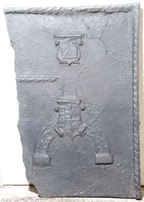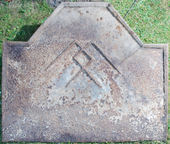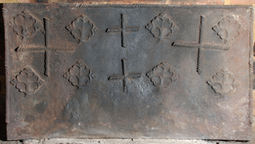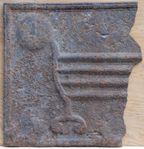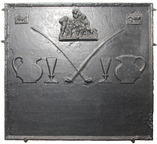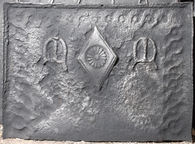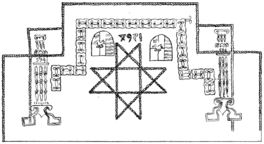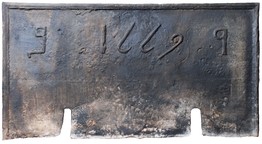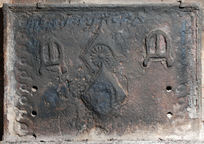-
457
Description: Fragment; right part, prob. rectangular; twisted strip edging (top and sides); stamp of firedog with semi-circular feet, and with shields at top and bottom of shaft, the lower with quartered arms, the upper with diagonal bar over a rectangle (gate?); horizontal twisted strip length to left of firedog.
Notes: The twisted lengths clearly show the flattened form of a strip of material (poss. leather).
- Decoration tags:
- rectangular (shape)
- twisted leather (edging)
- simple stamps
- objects
Manufactured: in the 16th century in the Weald area of England.
Current location: Anne of Cleves House, Southover High Street, Lewes, East Sussex, England.
Museum number: LH000.914 (part of the Sussex Archaeological Society museum group)
- Attached to series:
- Firedog stamp firebacks
- Metalware stamp firebacks
-
465
Description: Rectangular with three-faced arch; ogee moulded edging; top centre, overlapping, crossed staples arranged diagonally, each pointing to a bottom corner.
Notes: The crossed staple is the badge of the Nevill family, and this fireback came from Eridge Park, the seat of the Marquess of Abergavenny.
- Decoration tags:
- rectangular with three-facetted arch (shape)
- cyma reversa/ogee (edging)
- simple stamps
- heraldic
- objects
Manufactured: in the 18th century possibly in the Weald area of England.
Current location: in private hands, Little Horsted, East Sussex, England.
- Attached to series:
- Personal firebacks
- Metalware stamp firebacks
-
846
Description: Rectangular; twisted rope edging (top and sides); floriated trefoil stamp repeated in two rows of four in the upper two-thirds of the plate; between the middle four stamps, two small crosses of twisted rope, one above the other; between each outer group of four stamps a large cross of twisted rope.
Notes: The floriated trefoils may have been derived from a metal ornament.
- Decoration tags:
- rectangular (shape)
- rope (edging)
- simple stamps
- apotropaic
- objects
Manufactured: in the mid- to late-16th century in the Weald area of England.
Current location: in private hands, Barcombe, East Sussex, England.
- Attached to series:
- Miscellaneous stamp firebacks
- Metalware stamp firebacks
-
1086
Description: Fragment; rectangular shape; ovolo-moulded edging; image of an iron grate with barred front and integral andiron with iron or brass disc.
Notes: A unique example; it is not certain how the mould was formed, whether by impressing an actual grate or carving a pattern with the image of a grate; the former seems more likely.
- Decoration tags:
- rectangular (shape)
- ovolo (edging)
- simple stamps
- objects
Manufactured: in the mid- to late-17th century possibly in the Weald area of England.
Current location: in private hands, Outwood, Surrey, England.
- Attached to series:
- Miscellaneous pattern firebacks
- Metalware stamp firebacks
-
551
Description: Rectangular; ovolo-moulded edging; top centre, stamp formed of a carved domestic scene of a family around a table, between two small mirrored rectangular stamps each of a cow; lower centre, symmetrical arrangement of two jugs, two goblets and two crossed churchwarden pipes, all in low relief.
Notes: The domestic group has been formed from a decorative iron mantelpiece ornament portraying the tale of the goose that laid golden eggs. Having killed the goose, the family are lamenting the loss of their bounty (see Ames, 1980, p.94). The style of the fireback suggests a pastiche using designs suggesting the past. The same mantelpiece group can be seen as decoration on the kitchen spit assemblage at Petworth House, West Sussex, which was cast at Robert Chorley's foundry at Cocking, south of Midhurst. Evidently this and another fireback bearing the same ornament stamp were among items from the Cowdray estate sold in 1898. Mitford collection, Petworth House.
- Decoration tags:
- rectangular (shape)
- ovolo (edging)
- carved stamps
- animals
- humans
- objects
Manufactured: in the early-19th century probably at Cocking Foundry in the Weald area of England.
Current location: Petworth House, Petworth, West Sussex, England.
Museum number: NT/PET/M/43 (part of the National Trust museum group)
Citation: Ames, A., 1980, Collecting Cast Iron (Ashbourne, Moorland Publishing).
- Attached to series:
- Cocking foundry firebacks
- Ornament stamp firebacks
- Metalware stamp firebacks
-
558
Description: Arched rectangular shape; fillet edging; top centre, stamp formed of a carved domestic scene of a family around a table; in top corners, repeated small stamp of St George and the Dragon; below, repeated stamp of a pineapple in a pot; centre; small stamp of the royal arms of the United Kingdom 1801-37.
Notes: The domestic group has been formed from a decorative iron mantelpiece ornament portraying the tale of the goose that laid golden eggs. Having killed the goose, the family are lamenting the loss of their bounty (see Ames, 1980, p.94). The same mantelpiece group and pineapple stamp can be seen as decoration on the kitchen spit assemblage at Petworth House, West Sussex, which was cast at Robert Chorley's foundry at Cocking, south of Midhurst. Evidently this and another fireback bearing the same ornament stamp were among items from the Cowdray estate sold in 1898. Mitford collection, Petworth House.
Arms: Royal arms of the United Kingdom 1801-37
- Decoration tags:
- rectangular with round arch (shape)
- fillet (edging)
- carved stamps
- armorial
- royal
- animals
- humans
- plants
Manufactured: in the early-19th century probably at Cocking Foundry in the Weald area of England.
Current location: Petworth House, Petworth, West Sussex, England.
Museum number: NT/PET/M/50 (part of the National Trust museum group)
Citation: Ames, A., 1980, Collecting Cast Iron (Ashbourne, Moorland Publishing).
- Attached to series:
- Cocking foundry firebacks
- Ornament stamp firebacks
- Metalware stamp firebacks
-
640
Description: Rectangular; ovolo-moulded edging (top and sides); repeated guilloche pattern inside top and side edges; upper centre, lozenge stamp with ovolo edges and recessed daisy flower in centre, between buckle stamps repeated twice.
Notes: The lozenge stamp is a design also seen on domestic interior panelling; the buckles suggest a Pelham family association; the buckle and lozenge are separate stamps, and in each example their relative positions differ slightly; the guilloche design appears to have been carved on the base panel; an example at The Star Inn, Alfriston, Sussex measures 665mm x 480mm.
- Decoration tags:
- rectangular (shape)
- ovolo (edging)
- carved stamps
- carved pattern panels
- heraldic
- objects
Manufactured: in the early- to mid-17th century in the Weald area of England.
Current location: Mark Ripley Forge & Fireplaces, Northbridge Street, Robertsbridge, East Sussex, England.
- Attached to series:
- Pelham family firebacks
- Pelham buckle and lozenge series
- Metalware stamp firebacks
-
1015
Description: Rectangular with two-stepped top; twisted rope edging (top and sides); twisted rope extensions enclosing intermediate step with rope continued parallel to sides; central rope octagram with reversed date above between repeated inverted shield shapes off-set (left higher than right); the shield blazon: barry wavy impaling quarterly, overlaid with a small bird stamp and an indistinct ?bird shape in the top left quarter as viewed; within the rope, a roughly parallel arrangement of 23 double-loop-patterned stamps, with the faint impression of an additional stamp in the top right corner of the arrangement; outside the loop stamps and partially overlying the vertical rope extensions, the impressions of two classically designed firedogs with Ionic capitals and fluted pilasters, bearing the date 1594, but with the '1' missing; the fluting on the pilasters has been overlaid by the repeated impression of a turned peg.
Notes: A large and remarkably elaborate fireback: the octagram, a device seen more commonly on French firebacks than on English ones, suggests an apotropaic purpose; the impression of the firedogs was clearly made after the laying of the rope lengths and impressed less deeply as the rope impression has not been obliterated by the firedog on the left side. A fireback with the same loop stamps bears the same date using the same numerals but impressed the correct way round. Currently obscured behind a wood stove.
Inscription: 4951 [5 reversed] / 594 594
- Decoration tags:
- stepped (shape)
- rope (edging)
- simple stamps
- carved stamps
- individual numbers
- apotropaic
- armorial
- text
- objects
Manufactured: in 1594 in the Weald area of England.
Current location: Fyning Manor, Rogate, West Sussex, England.
-
903
Description: Rectangular; ovolo-moulded edging (top and sides); date between split initials across upper half of plate; two notches cut away for insertion of firedogs.
Notes: The ‘6s’ appear to have been moulded from a type of jemmy.
Inscription: g 1669 P [reversed]
- Decoration tags:
- rectangular (shape)
- ovolo (edging)
- simple stamps
- carved stamps
- individual letters
- individual numbers
- text
- objects
Manufactured: in 1669 possibly in the Weald area of England.
Current location: George & Dragon Inn, Speldhurst Hill, Speldhurst, Kent, England.
- Attached to series:
- Andiron slot firebacks
- Metalware stamp firebacks
- Miscellaneous stamp firebacks
-
829
Description: Rectangular; ovolo-moulded edging (top and sides); repeated guilloche pattern inside top and side edges; upper centre, lozenge stamp with ovolo edges and recessed daisy flower in centre, between buckle stamp repeated twice; the lozenge stamp is repeated over-stamping the lower part of the first.
Notes: The lozenge stamp is a design also seen on domestic interior panelling; the buckles suggest a Pelham family association; the buckle and lozenge are separate stamps, and in each example their relative positions differ slightly; the guilloche design appears to have been carved on the base panel; an example at The Star Inn, Alfriston, Sussex measures 665mm x 480mm.
- Decoration tags:
- rectangular (shape)
- ovolo (edging)
- carved stamps
- carved pattern panels
- heraldic
- objects
Manufactured: in the early- to mid-17th century in the Weald area of England.
Current location: in private hands, Iford, East Sussex, England.
- Attached to series:
- Pelham family firebacks
- Pelham buckle and lozenge series
- Metalware stamp firebacks
